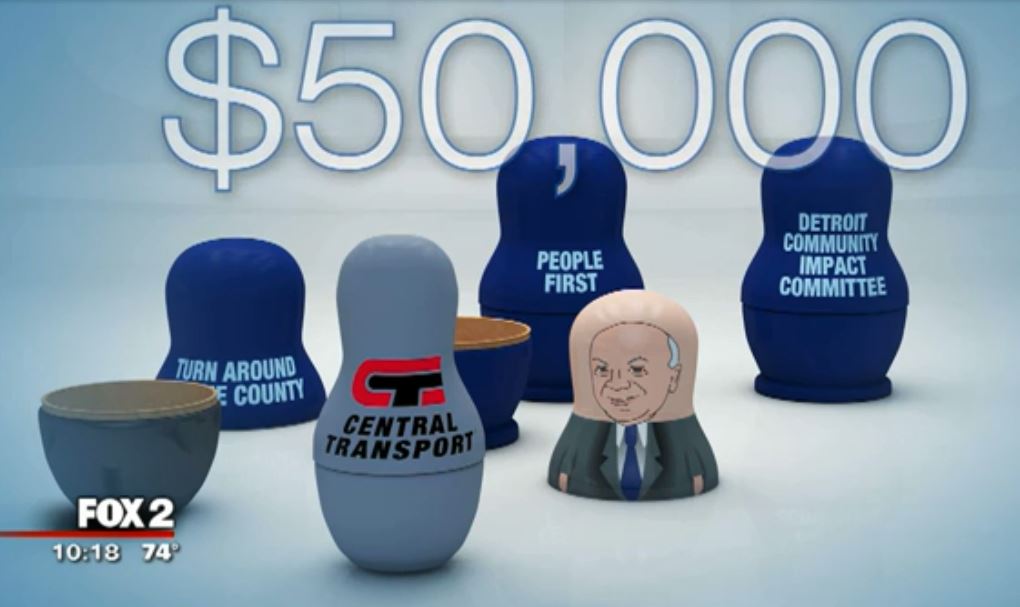Moroun Family Was Biggest Spender in Detroit City Council Elections [TRANSCRIPT and VIDEO]
Investigation finds Moroun money came in late to candidates, delaying disclosure until after voting.

The Moroun family and related companies spent more money than any other person or entity in the Detroit City Council elections last year.
The contributions that were not reported before voters went to the polls because of “a web of Super PACs and disclosure loopholes,” according to an investigation by the Michigan Campaign Finance Network and Fox 2 Detroit.
The joint reporting found that Morouns and companies they run spent about $184,200 in the nine council races in Detroit in 2017.
“The spending total was more than double what any other group shelled out for the council races. However, a Detroit voter wouldn’t have been able to determine that fact until Jan. 31, 2018, nearly three months after the election,” the reporting found.
CLICK HERE for the full MCFN story. Here is M.L. Elrick’s Fox 2 report:
Craig Mauger, executive director of the Michigan Campaign Finance Network, spoke with WDET’s Sandra Svoboda.
Click on the audio above to hear that conversation. Here’s a full transcript:

Sandra Svoboda: What did your investigation find?
Craig Mauger: We found that in the 2017 Detroit city council elections, there was no one who spent more money on the campaigns than the Moroun family and their connected companies, and we found that those companies often exercised their spending in ways that was difficult to track, and it often couldn’t be tracked until well after the election was over.
Svoboda: Why not?
Mauger: Because Central Transport and the Detroit International Bridge Company funded three Super (political action committees) PACS which did their spending extremely late in the election cycle. Often the spending would happen or be reported to have happened the day of the election or the day before the election so it didn’t have to be reported on public financial disclosures until January 21, 2018, a few months after the election. In one situation, a lobbying firm loaned a Super PAC money before the election and then after the election Central Transport gave money to that Super PAC and the money was used to pay back the lobbying firm. So again, you couldn’t see Central Transports involvement until well after the election was over.
Svoboda: Have you seen that kind of dynamic with money in local elections anywhere else in Michigan?
Mauger: We have not. I should say this has happened in other states. It’s happened at the national level in U.S. Senate races where Super PACs have used certain strategies to delay disclosure. In terms of local races, I can’t remember anything in recent memory similar to this, especially considering the fact that three different Super PACS were involved in this.
Svoboda: Which campaigns in Detroit in 2017 were the Morouns spending money on?
Mauger: They spent money in a majority of the council races one way or another either through the Super PACS or direct giving to candidates. The races that really saw heavy spending from the Super PACs that they funded was Raquel Castenada Lopez’s race in the 6th district, Roy McAllister’s race in the 2nd district, and there was also heavy spending in the Mary Sheffield race, which I think is the 5th district. They were supporting Jewel Ware. They were supporting Roy McAllister. They were supporting Tyrone Carter.
Svoboda: What conclusions can we draw from that about why they were putting money into those races?
Mauger: There are a lot of hypotheses about that. You have the Moroun family through a spokesperson has kind of said, “We are supporting candidates in some ways that align with our views, and a lot of the spending is done by these Super PACs and we just fund them and they make the decisions about what happens with the spending.” But also the candidates who have been opposed by them say they think that this is because they have opposed the Morouns on very specific issues: community benefits agreements. Some of the candidates that were opposed by these Super PACS had a different stand on community benefits agreements than the Morouns. And there was a deal in 2015 regarding Riverside Park, which WDET has reported on which was also a touchstone issue here I think.
Svoboda: Money is always spent in political races. Why did this raise red flags for you?
Mauger: It raised red flags just because of the large amount of spending and the way the disclosures came that we didn’t get them until late after the election.
